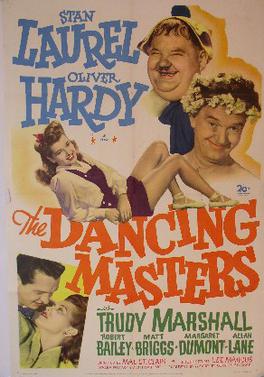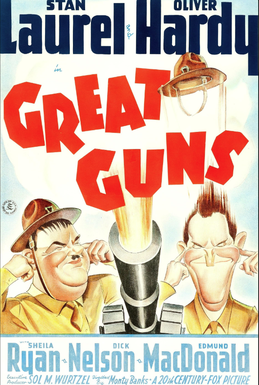Related Research Articles

Laurel and Hardy were a British-American comedy team during the early Classical Hollywood era of American cinema, consisting of Englishman Stan Laurel (1890–1965) and American Oliver Hardy (1892–1957). Starting their career as a duo in the silent film era, they later successfully transitioned to "talkies". From the late 1920s to the mid-1950s, they were internationally famous for their slapstick comedy, with Laurel playing the clumsy, childlike friend to Hardy's pompous bully. Their signature theme song, known as "The Cuckoo Song", "Ku-Ku", or "The Dance of the Cuckoos" was heard over their films' opening credits, and became as emblematic of them as their bowler hats.

Oliver Norvell Hardy was an American comic actor and one half of Laurel and Hardy, the double act that began in the era of silent films and lasted from 1926 to 1957. He appeared with his comedy partner Stan Laurel in 107 short films, feature films, and cameo roles. He was credited with his first film, Outwitting Dad, in 1914. In most of his silent films before joining producer Hal Roach, he was billed on screen as Babe Hardy.

Harold Eugene "Hal" Roach Sr. was an American film and television producer, director and screenwriter, who was the founder of the namesake Hal Roach Studios.

Charles Joseph Parrott, known professionally as Charley Chase, was an American comedian, actor, screenwriter and film director. He worked for many pioneering comedy studios but is chiefly associated with producer Hal Roach. Chase was the elder brother of comedian/director James Parrott.

Babes in Toyland is a Laurel and Hardy musical Christmas film released on November 30, 1934. The film is also known by the alternative titles Laurel and Hardy in Toyland, Revenge Is Sweet, and March of the Wooden Soldiers, a 73-minute abridged version.

Sidney Meltzer, known professionally as Sid Melton, was an American actor. He played the roles of incompetent carpenter Alf Monroe in the CBS sitcom Green Acres and Uncle Charlie Halper, proprietor of the Copa Club, in The Danny Thomas Show and its spin-offs. He appeared in about 140 film and television projects in a career that spanned nearly 60 years. Among his most famous films were Lost Continent with Cesar Romero, The Steel Helmet with Gene Evans and Robert Hutton, The Lemon Drop Kid with Bob Hope, and Lady Sings The Blues with Diana Ross and Billy Dee Williams. He was a regular on The Danny Thomas Show and Green Acres, and appeared in flashback on several episodes of The Golden Girls as Salvadore Petrillo, the long-dead husband of Sophia and father of Dorothy.

A Chump at Oxford is a Hal Roach comedy film produced in 1939 and released in 1940 by United Artists. It was directed by Alfred J. Goulding and is the penultimate Laurel and Hardy film made at the Roach studio. The title echoes the film A Yank at Oxford (1938), of which it is a partial parody.

Atoll K is a 1951 Franco-Italian co-production film—also known as Robinson Crusoeland in the United Kingdom and Utopia in the United States – which stars the comedy team Laurel and Hardy in their final screen appearance. The film co-stars French singer/actress Suzy Delair and was directed by Léo Joannon, with uncredited co-direction by blacklisted U.S. director John Berry.

The Bullfighters is a feature film starring comedy duo Laurel and Hardy, the sixth and final film the duo made under 20th Century Fox as well as the last released in the United States.

The Dancing Masters is a 1943 black and white American comedy film directed by Malcolm St. Clair, produced by 20th Century-Fox, and featuring Laurel and Hardy. A young Robert Mitchum has a small, uncredited role as a gangster posing as an insurance salesman.

Great Guns is a 1941 American comedy film starring Laurel and Hardy. It was directed by Monty Banks, and produced by Sol M. Wurtzel for 20th Century-Fox.

Hollywood Party, also known under its working title of The Hollywood Revue of 1933 and Star Spangled Banquet, is a 1934 American pre-Code musical film starring Laurel and Hardy, The Three Stooges, Jimmy Durante, Lupe Vélez and Mickey Mouse. It was distributed by Metro-Goldwyn-Mayer. Each sequence featured a different star with a separate scriptwriter and director assigned.

Monster from the Ocean Floor is an American 1954 science fiction film about a sea monster that terrorizes a Mexican cove. The film was directed by Wyott Ordung and starred Anne Kimbell and Stuart Wade.

Robert Lenard Lippert was an American film producer and cinema chain owner. He was president and chief operating officer of Lippert Theatres, Affiliated Theatres and Transcontinental Theatres, all based in San Francisco, and at his height, he owned a chain of 139 movie theaters.

Louis Weiss was an American independent producer of low-budget comedies, westerns, serials, and exploitation films.
Hal Roach's Streamliners are a series of featurette comedy films created by Hal Roach that are longer than a short subject and shorter than a feature film, not exceeding 50 minutes in length. Twenty of the 29 features that Roach produced for United Artists were in the streamliner format. They usually consisted of five 10-minute reels.
Edward Francis Finney (1903–1983) was an American film producer and director. He is best known as the man who introduced cowboy singer Tex Ritter to the moviegoing public.

Stan & Ollie is a 2018 biographical comedy-drama film directed by Jon S. Baird. The script, written by Jeff Pope, was inspired by Laurel and Hardy: The British Tours by A.J. Marriot which chronicled the later years of the comedy double act Laurel and Hardy; the film stars Steve Coogan and John C. Reilly as Stan Laurel and Oliver Hardy. The film focuses on details of the comedy duo's personal relationship while relating how they embarked on a gruelling music hall tour of the United Kingdom and Ireland during 1953 and struggled to get another film made.
Sony's Spider-Man Universe (SSU) is an American media franchise and shared universe centered on a series of superhero films produced by Columbia Pictures in association with Marvel Entertainment. Distributed by Sony Pictures Releasing, the films are based on various Marvel Comics characters and properties commonly associated with the character Spider-Man, who is not prominently featured in the franchise.
References
- ↑ Davis p.84
- ↑ The Films of Samuel Fuller – Wesleyan University Press
- ↑ American New Wave Cinema, A History (Part One)
- ↑ Eclipse Series 5: The First Films of Samuel Fuller|The Criterion Collection
- ↑ MacGillivray, Scott, Laurel and Hardy: From the Forties Forward, iUniverse, 2009, p. 185. ISBN 978-1-4401-7239-7.